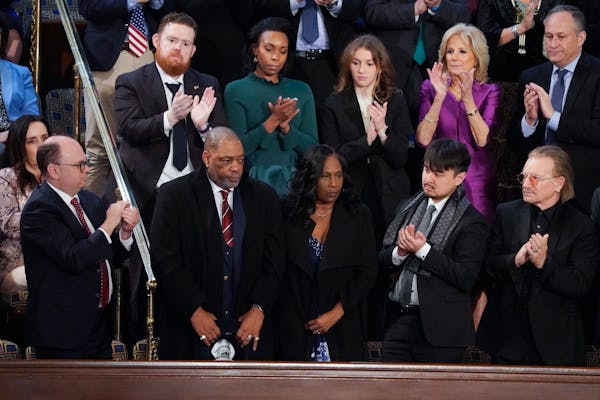The Minnesota Board of Peace Officer Standards and Training, which licenses law enforcement officers in the state, is expected to adopt language Thursday defining what constitutes an extremist organization or hate group with the aim of keeping racists and extremists out of law enforcement agencies.
The POST board will vote on a set of recommendations from two administrative law judges, who found the preliminary rules approved by the board needed more precise terminology regarding extremist groups.
If the board approves the rule changes it will still need final approval by Chief Administrative Law Judge Jenny Starr, and then by the governor's office, which is expected. The rules could take effect anytime from April to late June.
Judges Eric Lipman and Suzanne Todnem issued a 37-page report Jan. 23, generally approving the rules covering areas such as prohibitions against officers' use of excessive force. But they found rules barring officers from membership or association with an "extremist hate group" or "white supremacist" group as too vague.
The judges recommend defining a hate or extremist group by an official statement or set of principles, or the statements of its leaders or members, that it supports activities promoting "the use of threats, force, violence or criminal activity ... against a local, state or federal entity or the officials of such an entity."
That would include groups that "deprive or attempt to deprive individuals of their civil rights" under the Minnesota or U.S. constitutions, in order to "achieve goals that are political, religious, discriminatory or ideological in nature" or "promote seditious activities."
It would also include groups that advocate "for differences in the right to vote, speak, assemble, travel or maintain citizenship based on a person's perceived race, color, creed, religion, national origin, disability, sex, sexual orientation, gender identity, public assistance status or any protected class as defined in Minnesota statutes or federal law."
The new rules would bar dissemination of materials that promote the use of threats, force, violence or criminal activity, and seditious activity; engage in cyber or social media posts, chats and forums; or display the use of insignia, colors, tattoos, hand signs, slogans or codes associated with the group, including direct financial or in-kind contributions to the group or attendance at such meetings.
Kelly McCarthy, POST Board chair, said in a recent interview that she agreed with the law judges' recommendations. She said POST Board policy already prohibits activity by officers that damages public faith in equitable law enforcement.
"Our rules should mirror our policies and so when you look at the threats we face as a country and as a profession, extremism is at the top of the list," she said.
Vida Johnson, an associate professor at Georgetown Law School in Washington, has written extensively about officers who belong to extremist groups and said it's a significant problem. Minnesota would be wise to adopt such rules, she said, "but I think it is only a start. There are so many people who harbor extremist views who are smart enough not to join an extremist group."
She noted that well over 40 law enforcement officers were at the pro-Trump rally in Washington, D.C., on Jan. 6, 2021, before the U.S. Capitol was stormed, and that at least three officers have been convicted.
Chuck Wexler, executive director of the Police Executive Research Forum in Washington, D.C., said the Minnesota rules represent a trend among departments nationwide. "Departments are very concerned about hiring anyone who has any ties to extremist groups," he said.
McCarthy said Minnesota law enforcement agencies now require officers to submit pictures of their tattoos when they interview applicants, "and make clear what type of person they don't want."
Under the new rules, she said, the POST Board would launch an investigation after receiving allegations of officers belonging to an extremist group that could lead to censure, suspension or license revocation.
It isn't clear if other states have adopted similar rules. An Oregon board that oversees police licensing is drafting rules to require that applicants must have psychological evaluations that include an assessment of their tendencies, feelings and opinions about diverse cultures, races, ethnicities and economic status.
Michael German, a fellow at the Brennan Center for Justice and a former FBI agent, said while it's important that law enforcement agencies bar membership in extremist groups, complaints of racist misconduct from both inside the department and out in the community must be examined.
"Too often the problem officers are known to people in the department, and it is essential to have strong protections for officers who report misconduct," he said.
McCarthy said she didn't know the extent to which Minnesota officers may be affiliated with extremist groups but she cited several examples, including a report in 2020 that a St. Paul police officer had a "Three Percenter" sticker on the back window of his pickup truck. Three Percenters are identified by the Southern Poverty Law Center as an extremist group that conducts paramilitary training.

Want to share info with the Star Tribune? How to do it securely

'Safe recovery sites' would offer syringes, naloxone and more to people using drugs. The plan could be in peril.
New Minnesota GOP leaders seek peace with party's anti-establishment wing

Who is Republican Lisa Demuth, Minnesota's first House speaker of color?

